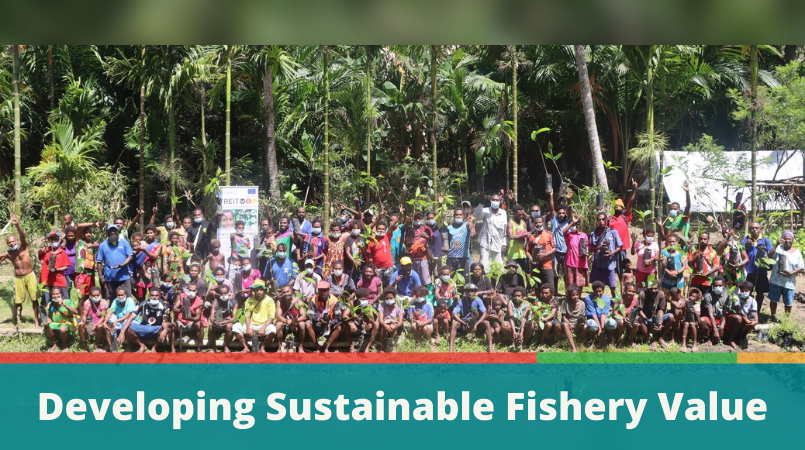
In a general context, fish is an essential part of the daily diet of riverine and coastal communities in the Greater Sepik Region in Papua New Guinea. It is also a reliable source of regular income for smallholders in the area.
In the low altitude communities in the region, fish consumption is the most important source of protein, comprising around 40% of all food from animal sources. In the middle and higher altitude villages, where fishing is limited to creeks and small rivers, consumption of animal proteins is more reliant on purchased sources such as preserved fish and canned products.
Despite these facts, the average fish consumption is still below the recommended levels for good nutrition, particularly in view of the nutritional value of fish.
Also, due to poor infrastructure and equipment, lack of knowledge and skills, and deficiency in effective regulations and management, this resource remains under-utilized. In this context, the harvested fish are mostly marketed fresh to local markets and as smoked/dried products, but there is a very limited value addition to the fish catch.
The EU-STREIT Programme in PNG, in collaboration with the National Fisheries Authority (NFA) and provincial divisions of Fisheries & Agriculture and Livestock, provides support to sustainably increase productivity and profitability of fish while also contributing significantly to food security and nutrition at the household level.
The support includes strong investment in developing the capacity as well as the introduction of improved practices, techniques, equipment and facilities for better production, processing and marketing of fish among fishing communities, fisheries enterprises and relevant government institutions.
The Programme is also committed to facilitating the access of fisheries communities to the markets and assisting them in improving existing transport safety and equipment.
Noting the critical but under-recognized contribution made by the women and youths in the fishery value chain, the Programme as part of its mandate in promoting women and youth inclusion, is focused on professionalizing informal activities in which rural women and youths are traditionally involved through organization, formalization, and training the women and youths on processing, packaging, agri-dealership and marketing.
The programme today released a factsheet noting ‘achieved results’ and ‘ongoing interventions.’
Achieved results include:
- Partnered with the National Fisheries College to build the capacity of 12 provincial fishery officers on Aquaculture and Fisheries Officer Operations
- Conducted riverine fisheries assessments in five Local-Level Governments and determined constraints and needs by riverine fishers in fishing operations, post -harvest handling and fish preservation.
- Surveyed seven districts in the Programme target areas and determined needed capacity building interventions to improve and develop fish farming activities particularly in inland communities
- Profiled 71 fish business groups, 19 Micro, Small and Medium Enterprises, eight fisheries cooperatives, and one fish association and determined constraints and needs of fishermen and fish processors to improve capacity in fishing operations and fish processing and marketing.
- Conducted fish farming training for 39 fish farmers
- Specified 28 different fisheries equipment and gears required to support fish farmers, fishermen and fish processors
While ongoing interventions include:
- Partnering with a leading local NGOs/service provider to organise 60 fish farms clusters and train 1 500 women and youth farmers on fish farming in four districts of East Sepik Province
- Extending technical assistance to Sandaun Province with training fishers on fish farming
- Organising training sessions on installation and deployment of Fish Aggregating Device and Safe Fishing Operations
- Conducting training programs on seafood handling and fish preservation • Introducing the improved Fish Smoking Technology (FTT) to women riverine fishers
- Profiling further fisher groups in the Programme’s target areas • Profiling fish processors in coastal areas of East Sepik
- Developing fish farming training manuals in collaboration with NFA and Provincial Fisheries Office
- Supporting establishment of fisheries training facility in East Sepik Province
The EU-STREIT Programme in Papua New Guinea, being implemented as a United Nations Joint Programme (FAO as leading agency/administrative agent, and ILO, ITU, UNCDF and UNDP as implementing partners), is the largest grant-funded programme of the European Union in the country and the Pacific region.
As an evidence-based, country-led and country-owned programme, the EU-STREIT PNG focuses on increasing sustainable and inclusive economic development of rural areas in East Sepik and Sandaun provinces.
This international rural agriculture development programme works on increasing the economic returns and opportunities from cocoa, vanilla and fishery value chains and strengthening and improving the efficiency of value chain enablers, including the business environment and supporting sustainable, climate-proof transport and energy infrastructure development in target areas.
